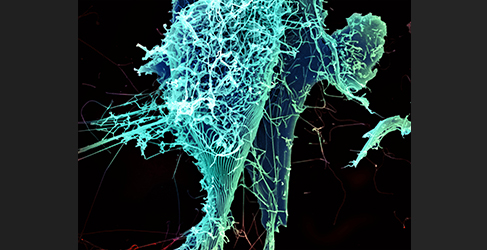Cybernetics and Society

| Created: | 2016-11-02 10:54 |
|---|---|
| Institution: | Centre for Research in the Arts, Social Sciences and Humanities |
| Editors' group: | Editors group for "Centre for Research in the Arts, Social Sciences and Humanities". |
| Description: | Cybernetics as a History of the Present
As more and more of our collective activities (education, pension planning, health management, environmental protection) are mediated by rapidly moving markets and computerized technologies, uncertainties abound. Ours, we are told, is an information age, in which new forms of data collection and analysis will enable ever more efficient management of supply chains, regulation of energy usage and even allocation of personal time. Such visions of a technologically mediated — and seemingly limitless — future are not new. They echo the technological futurism popularized in the middle of the twentieth century by cybernetics. Beginning with the 1948 publication of Norbert Wiener’s book, Cybernetics: Or Control and Communication in the Animal and the Machine, cybernetics inaugurated path-breaking scientific explorations of feedback and self-regulation in biological and mechanical system. In the process, it provided the conceptual foundation for contemporary advances in fields such as bioinformatics, operations research, game theory and artificial intelligence. Our group brings together a diverse range of experts in the humanities, the social and computational sciences, law and the arts. Together we examine how emerging information models are altering experiences of social belonging and the ways in which citizens are situated within emerging projects of governance and market allocation. Revisiting mid-century information science and its multiple offshoots offers a powerful framework for addressing the multidisciplinary questions raised by Big Data and its growing centrality to contemporary social life. Cybernetics attracted scholars from a surprisingly wide array of disciplines, because it provided a language and method for commensurating diverse phenomena. Mathematicians, physicists, linguists, anthropologists, psychologists and biologists, working in collaboration, made cybernetics a popular scientific reference during the 1950s and 1960s. Their research formed a particularly American response to the challenges of the post-World War II era, combining US Cold War defense funding with support from private foundations, academic centers and emerging industry. While much of this history is well researched, our work challenges the common notion that cybernetics was merely a vogueish mid-century techno-science, which fell into obscurity by the1970s. Instead we seek to understand more precisely how systems analysis and practices of control and regulation persisted beyond that moment, transformed by new emphases on open (as opposed to closed) systems, and on disruption and innovation (rather than homeostasis). How does the language of optimization alter how we measure and understand human excellence in everything from teacher performance to healthcare outcomes? What are the ethical commitments of the cybernetic sciences? How are ideas of legal justice and human rights transformed as the limits of personhood itself come to be quantified with new precision? The opportunity to cast our net far and wide — though challenging — will allow us to think about familiar questions differently, and in dialogue with knowledge outside of our individual disciplines. Our aim is not merely to investigate the history of information theory, but to understand more precisely how the conceptual logic of our current information infrastructure has developed over the course of the last 70 years. Cybernetics and Society will sponsor 12 fortnightly meetings throughout the academic year, four each term. We will intersperse smaller, reading group sessions with public lectures. Doing so gives us an opportunity to engage with speakers' work ahead of time and will help support a more robust and lively discussion with our invited guests. Themes will include Systems Science and Industrial Management; Histories of Modern Risk; Cybernetics and Design Thinking; Rethinking Cold War Science; Historicising the Information Age; and Cybernetics and the Psychology of Happiness. |
| Website: | http://www.crassh.cam.ac.uk/programmes/cybernetics-and-society |
Media items
This collection contains 6 media items.
Media items
Cybernetics and Society - 1 November 2016 - The Liberal Effect: System-Cybernetic Governmentality during the Cold War
306 views
Egle Rindzeviciute (Lecturer, Kingston University London)
Discussant: Franziska Exeler (University of Cambridge)
Cybernetics and systems analysis – both important...
Collection: Cybernetics and Society
Institution: Centre for Research in the Arts, Social Sciences and Humanities
Created: Wed 2 Nov 2016
Cybernetics and Society - 18 October 2016 - Cybernetics, Unknowability and Politics
440 views
Professor Andrew Pickering (Emeritus Professor in Sociology, Philosophy and Anthropology, University of Exeter)
Discussant: Professor Simon Schaffer (Professor of History of...
Collection: Cybernetics and Society
Institution: Centre for Research in the Arts, Social Sciences and Humanities
Created: Wed 2 Nov 2016
Cybernetics and Society - 25 April 2017 - The Disunity of Cybernetics and the Digital
210 views
Professor Ronald Kline, STS (Cornell)
Discussant: Dr Richard Staley (HPS, Cambridge)
Abstract
This seminar will focus on two works in progress: "Why the Disunity of...
Collection: Cybernetics and Society
Institution: Centre for Research in the Arts, Social Sciences and Humanities
Created: Tue 2 May 2017
Cybernetics and Society - 28 February - The Family as Machine: Film, Infrastructure and Cybernetic Kinship in Suburban...
365 views
Dr Bernard Geoghagen (Media, Coventry)
Discussant: Dr Christopher Ball (Anthropology, Notre Dame)
Abstract
How did the American family become a machine? Starting in the...
Collection: Cybernetics and Society
Institution: Centre for Research in the Arts, Social Sciences and Humanities
Created: Tue 21 Nov 2017
Cybernetics and Society - 6 April 2017 - Computational Rationality, NUTS, and the Nuclear Leviathan
178 views
Professor Sonja M. Amadae (University of Helsinki and MIT)
Discussant: Professor David Runciman (POLIS, University of Cambridge)
Abstract
This paper focuses on game theory...
Collection: Cybernetics and Society
Institution: Centre for Research in the Arts, Social Sciences and Humanities
Created: Thu 27 Apr 2017
Cybernetics and Society - 6 June 2017 - Cybernetic Fantasies of Value
262 views
Speaker: Dr. Seb Franklin, English (King's College London)
Discussant: Nathaniel Zetter, English (Cambridge)
Abtract
In January 1951, R. S. Hunt--a British technical...
Collection: Cybernetics and Society
Institution: Centre for Research in the Arts, Social Sciences and Humanities
Created: Mon 19 Jun 2017

